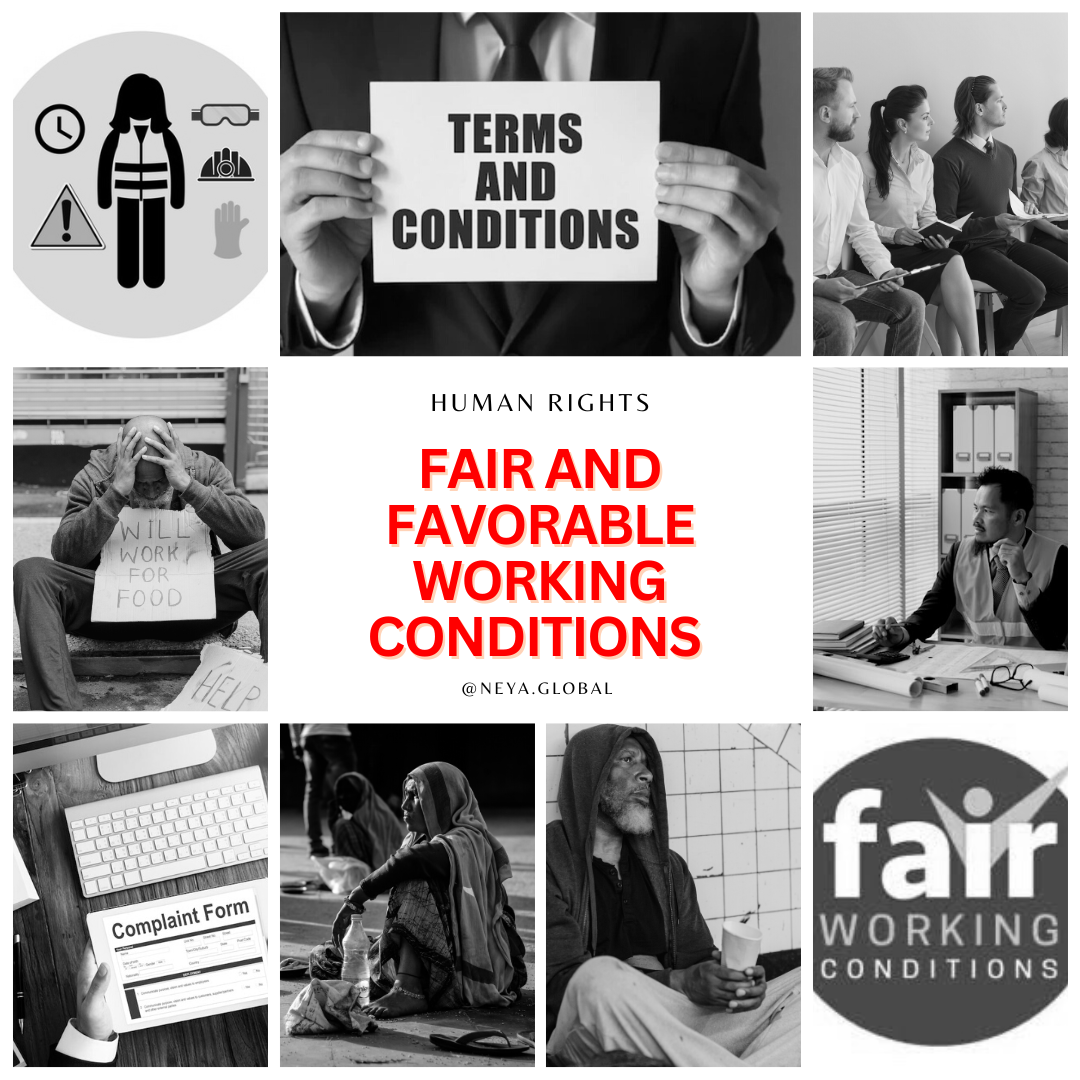Ensuring Dignity and Justice: The Right to Fair and Favorable Working Conditions

The right to fair and favorable working conditions is a fundamental human right that seeks to protect individuals in the workplace and ensure their well-being. It encompasses various aspects of work, including occupational safety, fair remuneration, and reasonable working hours. This right is vital for promoting human dignity, social justice, and sustainable development.

The right to fair and favorable working conditions finds its foundation in international human rights law. The Universal Declaration of Human Rights, adopted by the United Nations General Assembly in 1948, recognizes the right to just and favorable conditions of work. Additionally, the International Covenant on Economic, Social and Cultural Rights (ICESCR), adopted in 1966, further elaborates on this right.

The United Nations, through its specialized agency, the International Labour Organization (ILO), plays a crucial role in regulating and promoting the right to fair and favorable working conditions. The ILO develops and enforces international labor standards, known as conventions and recommendations, to protect workers' rights worldwide.

The significance of the right to fair and favorable working conditions cannot be overstated. It ensures the protection of workers' physical and mental health, their safety, and their economic well-being. By promoting safe and healthy working environments, fair wages, and reasonable working hours, this right contributes to the overall well-being and productivity of individuals and fosters social stability and economic development.
Throughout history, the struggle for fair and favorable working conditions has been a central part of workers' rights movements. Examples include the labor movements of the late 19th and early 20th centuries, where workers fought for better working conditions, reasonable hours, and fair pay. These movements led to the establishment of labor laws and regulations in many countries, setting minimum standards for working conditions.

However, challenges persist in ensuring the realization of this right. Some of the key challenges include:
- Exploitation and unfair labor practices: In many parts of the world, workers face exploitation, low wages, unsafe working conditions, and long hours, often in industries such as agriculture, manufacturing, and informal sectors.
- Informal economy: A significant number of workers are engaged in the informal economy, where they lack legal protection, access to social security, and proper working conditions.
- Gender inequality: Women often face discrimination in the workplace, including unequal pay, limited job opportunities, and sexual harassment, which undermine their ability to enjoy fair and favorable working conditions.
- Global supply chains: Globalization has led to complex supply chains, where workers may face exploitative conditions, low wages, and poor working environments due to subcontracting and lack of transparency.

Contributing to the realization of the right to fair and favorable working conditions requires collective efforts. Here are some ways to contribute:
- Raising awareness: Educate yourself and others about workers' rights, including the right to fair and favorable working conditions. Share information and engage in discussions to promote understanding and action.
- Advocacy and policy reform: Support organizations and campaigns that advocate for workers' rights and push for policy reforms that ensure fair and favorable working conditions. Contact your local representatives and urge them to address labor rights issues.
- Ethical consumerism: Make informed choices as a consumer by supporting companies and brands that uphold fair labor practices and provide fair and favorable working conditions to their employees. Consider supporting fair trade and ethical certifications.
- Workers' organizations: Support and join trade unions and workers' organizations that work to protect and promote workers' rights. These organizations play a crucial role in advocating for fair working conditions and negotiating with employers.

The right to fair and favorable working conditions is a fundamental human right that ensures the protection and well-being of workers. It encompasses safe and healthy working environments, fair wages, and reasonable working hours. Despite progress made in labor rights, challenges such as exploitation, gender inequality, and informal work persist. By raising awareness, advocating for policy reforms, supporting ethical consumerism, and joining workers' organizations, we can contribute to the realization of this right and create a fair and just working environment for all. Let us strive for a world where every worker is treated with dignity and enjoys fair and favorable working conditions.
Sources:
- Universal Declaration of Human Rights - www.un.org/en/universal-declaration-human-rights
- International Covenant on Economic, Social and Cultural Rights (
- Rights (ICESCR) - www.ohchr.org/EN/ProfessionalInterest/Pages/CESCR.aspx 3. International Labour Organization (ILO) - www.ilo.org/global/lang--en/index.htm
- Fair Labor Association (FLA) - www.fairlabor.org
- Clean Clothes Campaign - cleanclothes.org
- "The Evolution of Workers' Rights: A Global Perspective" by Professor Julia López López
- "The Fight for Fairness: A History of Workers' Rights Movements" by John Smith
- "Labor Rights and Globalization" by Lance Compa









